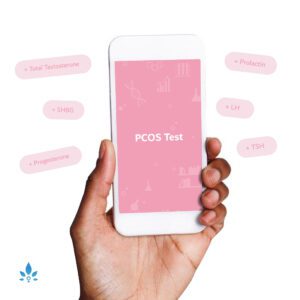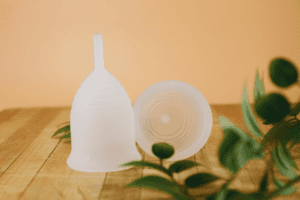Menstrual Cycles & Mental Health


Yoppie looks at the myths, misconceptions, truths and realities of the relationship between mental health and your menstrual cycle. *Originally posted on Yoppie.com.
Premenstrual syndrome (PMS) is something that most people who have periods will experience. Hormones are powerful, and when they’re fluctuating (as they do before your period) they can make us feel pretty physically and emotionally out of kilter. Sometimes, the symptoms of PMS can go beyond just discomfort, manifesting as premenstrual dysphoric disorder (PMDD) – a severe form of PMS.
Unfortunately, PMS is common. From bloating and headaches to bad skin and sensitive moods, a whopping 90% of us will experience at least one PMS symptom before our period.
If that wasn’t enough, before our period, hormones can also amplify things like anxiety, depression and other mental health conditions we may already be trying to manage. Thanks, hormones!
In this guide, Yoppie explores PMS, PMDD, uncovering the unique relationship between your period and your mental health to help you get on top of PMS for good!
Why understanding mental health & menstrual cycles is important
Because hormones have a hand in almost everything going on in our bodies, they also affect our brains and therefore, emotions. This is why hormones can directly influence our mental health, even if that change is just periodic and linked to our monthly cycle.
Learning about what your hormones are up to during your cycle can help you understand why you might be feeling a certain way. And although it won’t give you the power to suddenly control how you’re feeling all of the time, it can help you make sense of it.
It also acts as a reminder to stop our inner voice giving us such a hard time, and to be kind to ourselves instead. With the right knowledge and self-care, we can turn meltdowns and angst into understanding and compassion.
Many people will also experience a mental health condition at some point in our lives, whether that’s just briefly or something that has to be managed long term. Understanding how our hormones interplay with existing mental health conditions can help to avoid misdiagnosing PMS or PMDD. We’ll go into more detail about this a bit later in the guide.
Hormonal changes and how they affect your mood
What may look like on the surface to be uncontrolled anger, destruction and rage may actually be truth, justice and love. – Layla Saad
In the days leading up to your period, you might notice a subtle emotional shift, or it could feel more like dropping off the side of a cliff.
As well as physical symptoms like cramps and headaches, PMS can include emotional symptoms like:
- Tiredness and fatigue
- Teariness and emotional vulnerability
- Heightened anxiety
- Feeling generally unsettled
All this can mean that we’re:
- Not feeling very sexy (our libido and lubrication goes AWOL)
- More sensitive to criticism (from ourselves and others)
- Reacting more strongly to triggers
- Wanting to withdraw and spend some time alone
We’ve all heard PMS being dismissed with shallow quips when emotional reactions are judged to be out of place (usually by people who don’t have periods). The mindless comment “are you on your period or something?” is poised to instil rage rather than bestow any gems of insight.
We’re not immune to occasionally having a good laugh at ourselves when we do indulge in a bit of PMS fuelled behaviour, but generally, PMS just makes us more sensitive to things that would probably already bother us. The rose-tinted spectacles we wore during ovulation have come off and tolerance levels can drop.
What causes PMS?
As with many issues around women’s health, due to a lack of scientific research, it’s not known for sure exactly what causes PMS. But, there is a strong theory.
During ovulation, the female sex hormones oestrogen and progesterone peak. During the luteal phase (the phase in your cycle after ovulation) both these hormones begin to fall. Then there’s a second smaller peak as progesterone rises, peaks then drops again.The rapid rise and fall of these hormones can affect chemicals called neurotransmitters in our brains, namely:
- Serotonin
- Dopamine
Both of these neurotransmitters influence mood, sleep and energy levels, with low levels sometimes causing:
- Sadness
- Sleep problems
- Irritability
- Anxiety
- Food cravings
All symptoms of PMS and PMDD
But it seems not everyone is affected in the same way. Some experts believe genetic differences mean some people are more sensitive than others to changing hormones and the influence these have on the brain. This is because research suggests that women who develop PMS or PMDD actually have similar levels of progesterone and oestrogen to those who don’t.
What are “normal” PMS symptoms?
Everyone is different, so putting a label on what’s normal isn’t really possible. The best thing to do is to work out what’s normal for you, and if your normal is ok with you!
Generally, PMS symptoms last for a few days to a week before the start of a period and – although pretty dang unpleasant – shouldn’t have a significant impact on your overall well being. But, this isn’t the case for everyone.
Common PMS symptoms
Not everyone experiences all PMS symptoms, but some of the most common are:
- Withdrawing and detachment
It’s not unusual to start feeling a little detached in the days before your period. Social gatherings and parties suddenly seem less than appealing and your motivation is at a monthly low. - Low sex drive
Oestrogen takes a nosedive in this part of the cycle and takes vaginal lubrication along with it. Although you might be feeling a little needier and happy to give and receive physical affection, sex is probably not high on your priority list. - Change in appetite
You could be craving more of certain foods around this time, or, your appetite could disappear. It’s common to feel like eating sweet, carb heavy ‘comfort food’ – but that doesn’t mean it’s good for your PMS. - Feeling anxious, irritable or sensitive
You might find yourself getting teary, feeling extra stressed or just unwilling to let go of an injustice you’d normally gloss over. Feelings of anxiety can also bubble up around now and you might find yourself feeling insecure or questioning your job or relationships. You may also find that you’re being self critical about your choices and feelings. - Feeling tired but finding it hard to sleep
Despite feeling fatigued and lethargic, you might find it hard to fall asleep at night. Experts believe it’s not uncommon to experience weird nightmares or daydreams.
The NHS outlines some more symptoms here.
If you believe PMS symptoms are having a recurring, lasting and significant negative effect on your wellbeing, it may be worth exploring the possibility of PMDD, and/or your overall emotional and mental health.
Around 20 and 40% of women experience moderate to severe premenstrual symptoms (PMS). But between 3 and 8% of women experience symptoms that prevent them from functioning in normal daily life. This is premenstrual dysphoric disorder (PMDD).
PMDD: What to look out for:
- If your relationships at home and work are suffering – for example, do you find yourself breaking up with your boyfriend at the same time every month, or feel like quitting your job despite enjoying it most of the time?
- If your inner critic becomes overwhelming and starts tipping into self loathing.
- If you find yourself having suicidal thoughts or urges to self harm.
- If you feel unable to cope with everyday events or responsibilities like working, cooking, going to appointments or even leaving the house.
- If you’re finding it impossible to concentrate or constantly forgetting things.
- If you’re experiencing heart palpitations or anxiety attacks.
There can often be a relationship between PMDD and other mental health conditions. In fact, PMDD and PMS can mimic the symptoms of other conditions and vice versa, leading to misdiagnosis. This is why if you think you may have PMDD, it’s important to speak to an understanding GP.
What can get misdiagnosed as PMDD or PMS?
To make things even more confusing, there are several conditions that can imitate or overlap with PMS and PMDD symptoms. Things like:
- Depression
- Anxiety
- Perimenopause
- Chronic fatigue syndrome
- Irritable bowel syndrome (IBS)
- Thyroid disease
The emotional symptoms of depression and anxiety can be really similar to PMS. It’s thought that around half of women seeking treatment for PMS also have one of these conditions. Depression and anxiety can be around for the entire month – but still, unfortunately, get worse before or during periods.
Handling and adapting to your cycles and mood
One of the best ways to make the most of your cycles and mood is to start tracking your cycle. Once you start figuring out a pattern, not only will you be able to predict more accurately when you’re about to start your period, but you may start noticing a significant pattern to your emotions each month.
There are loads of apps around that can help you track your cycle, but it may take some trial and error to find one you like best. You could even just use a notebook or paper diary.
Harnessing hormonal ebbs and flows
We can’t all feel at our best all of the time. A bit of self reflection and down time can be the perfect antidote to a hectic month. If you’re naturally a little introverted, having a great excuse to slow things down can be a welcome relief. It can be the perfect time to give yourself some much-needed space for self-reflection and a little extra TLC.
Understanding your own personal cycle gives you the opportunity to make plans knowing in advance how you might feel. PMS week may not be the best to try out that new dancing spot, instead, schedule some one-on-one time with a close friend, a night in with some good food or even just a bath or hitting the sack early.
If you’re feeling emotional or teary, it can be exhausting trying to bottle your emotions up. Allow yourself to cry if that’s how you feel. Finding an outlet like watching a weepy film or listening to music in a space of your own, on your own terms, can be cathartic.
Coping with PMS
As well as tracking your cycle and slowing things down just before your period, here’s some general self care and coping tips to help kick PMS to the curb.
Diet
The food we eat helps us regulate our bodily functions, and one of those functions is the transport of certain hormones. Eating well throughout the month is one of the best and healthiest ways to curb PMS symptoms.
Deficiencies in certain vitamins and minerals such as B vitamins like Vitamin B6, Iron, Magnesium can affect hormones and make symptoms associated with PMS, worse. Likewise, although you might find yourself craving those sweet, carby meals and snacks – but overloading on sugar can also worsen PMS symptoms.
Exercise
Exercise can help alleviate PMS symptoms. Especially aerobic exercise. If you’re not an avid exerciser, don’t be put off – you don’t have to join a gym or take up running. Exercise should be available in some form to everyone. Experiment to find one that works for you.
From walking, jogging, skipping (jump rope) and swimming to local classes like yoga, pilates and spinning – there’s lots to choose from. Even just switching up your route to work to incorporate 30 minutes walking each day could make a noticeable difference.
Rest
PMS can affect our body clocks, making it more difficult to sleep even if we’re feeling lethargic. To try and counter this, tune out for as long as possible before bedtime. Try putting your phone away (staring at your phone before bed can make it harder to fall asleep), dimming the lights and doing something you find relaxing before shutting your eyes for the night.
Ensure the room you’re sleeping in is ventilated (opening the window for a short period of time each day can help to increase oxygen levels in the room) and make your bed as comfortable as possible.
Essential oils like lavender can also help aid sleep, so popping a few drops on your pillowcase might help you drift off.
Stress management
Stress has a habit of making any symptom worse, including those of PMS. Some people find that massage, yoga and meditation really help.
Don’t feel guilty about saying “no”. Although it’s a good time to take stock, It might help to try and avoid having any big or important discussions around this time.
Stop smoking
Studies have shown smoking can make PMS symptoms worse, so, apart from the fact it can cause cancer – another pretty good reason to stop!
Treatment options
If your PMS really has you at the end of your tether, you might want to speak to a healthcare professional to see if specific treatments are worth looking into. As well as lifestyle and habit changes your doctor can suggest things such as hormonal medicines, cognitive behavioural therapy or antidepressants to help beat those monthly blues.
For more in depth info on tackling PMS, PMDD and mental health – stay tuned. We’re on a mission to arm you with the facts you need to feel on top of your menstrual health for your whole cycle, every cycle.












































